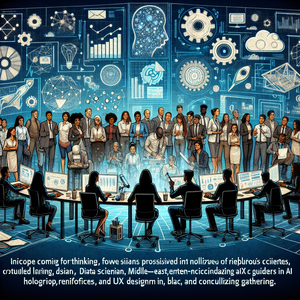The Power of Lifelong Learning – Upskilling for Career Change at 40

Lifelong learning is not just about acquiring new skills; it's about adapting to change, staying relevant, and maintaining a competitive edge in a dynamic job market. For individuals over 40, embracing this mindset can provide the tools necessary to navigate the complexities of transitioning careers. According to a report by the World Economic Forum, nearly 50% of all employees will need reskilling by 2025, highlighting the urgency of this endeavor. As technology continues to advance and industries undergo rapid transformation, the ability to learn continuously is no longer optional; it's essential for survival and success in the workforce.
Success Stories of Lifelong Learners
At 42, John was a seasoned marketing professional with a strong background in analytics. Recognizing the growing demand for data science skills, he enrolled in an online data analytics course. Within six months, John not only acquired the technical skills needed but also landed a position as a data analyst at a leading tech firm. His story illustrates that it’s never too late to pivot into a field that excites you. By leveraging his existing skill set and committing to learning new tools, John successfully transitioned into a rewarding career that aligned with his interests.
Success Stories of Lifelong Learners
After 20 years as a project manager, Maria decided to pursue her passion for art. She took evening classes in graphic design, leveraging platforms like Skillshare and Coursera. Within a year, Maria launched her freelance design business, combining her project management expertise with her newfound creativity. Her journey exemplifies how lifelong learning can lead to fulfilling careers. By taking calculated risks and investing time in her education, Maria not only found a new career path but also rediscovered her passion for creativity.
Strategies for Upskilling
Start by determining what skills are needed in your desired career. Research job descriptions to understand the qualifications and competencies employers are seeking. This foundational step will help you focus your learning efforts effectively.
Strategies for Upskilling
Websites such as Coursera, Udemy, and LinkedIn Learning offer a plethora of courses across various fields. Many are affordable and can be completed at your own pace, making them ideal for busy professionals. These platforms often feature courses created by industry leaders, ensuring that you receive relevant and up-to-date information.
Strategies for Upskilling
Look for local workshops, seminars, or conferences that focus on your area of interest. These not only provide valuable learning opportunities but also enable networking with others in the field. Engaging with peers can offer insights and connections that may facilitate your career transition.
Strategies for Upskilling
Many community colleges and libraries offer free or low-cost classes. Consider enrolling in these programs to learn new skills while meeting like-minded individuals. These resources often cater to adult learners and can provide a supportive environment for those returning to education.
Strategies for Upskilling
Establish relationships with mentors who have experience in your desired field. They can provide guidance, recommend resources, and help you navigate your career transition. A mentor can be instrumental in offering insider knowledge and encouragement as you embark on your new journey.
The journey of lifelong learning is paved with opportunities for growth, reinvention, and fulfillment, especially for those over 40. As demonstrated through the success stories of individuals like John and Maria, the commitment to upskilling can lead to exciting new career paths and personal satisfaction. By embracing a proactive approach to learning, you can turn the challenges of career change into a gateway for new possibilities. Remember, it’s never too late to invest in yourself and your future. In a world where the only constant is change, lifelong learning is not merely an asset; it is a necessity for those looking to thrive in their careers, regardless of age.
Data Analyst
Tech companies like Google and Amazon; financial institutions like JPMorgan Chase
Core Responsibilities
Analyze complex datasets to identify trends and insights that inform business strategy.
Use statistical tools and programming languages (e.g., Python, R) to manipulate data and perform analyses.
Create visualizations and reports to communicate findings to stakeholders.
Required Skills
Strong analytical and problem-solving skills, with proficiency in data visualization tools (e.g., Tableau, Power BI).
Familiarity with SQL and database management.
Experience in a specific industry can be a plus (e.g., marketing, finance).
UX/UI Designer
Digital agencies, software development companies, and startups
Core Responsibilities
Conduct user research and usability testing to inform design decisions.
Create wireframes, prototypes, and user interface designs that enhance user experience.
Collaborate with developers to ensure design feasibility and implementation.
Required Skills
Proficiency in design tools such as Adobe XD, Sketch, or Figma.
A strong understanding of user-centered design principles.
Knowledge of HTML/CSS can be beneficial.
Project Manager in Tech
IT firms, consulting agencies, and tech startups
Core Responsibilities
Oversee the planning and execution of technology projects, ensuring they meet deadlines and budgets.
Facilitate communication between cross-functional teams, including developers, designers, and stakeholders.
Manage project risks and develop mitigation strategies.
Required Skills
Strong organizational and leadership skills, with experience using project management tools (e.g., Jira, Trello).
Familiarity with Agile and Scrum methodologies.
Certification in project management (e.g., PMP, Scrum Master) is often preferred.
Digital Marketing Specialist
Marketing agencies, e-commerce companies, and corporate marketing departments
Core Responsibilities
Develop and implement online marketing campaigns to drive traffic and engagement.
Analyze performance metrics and use data-driven insights to optimize marketing strategies.
Manage social media accounts and create content that aligns with brand messaging.
Required Skills
Proficiency in SEO, PPC, and social media marketing platforms.
Strong analytical skills to interpret data and derive actionable insights.
Familiarity with marketing automation tools (e.g., HubSpot, Mailchimp).
Instructional Designer
Educational institutions, corporate training departments, and e-learning companies
Core Responsibilities
Design and develop educational programs and materials tailored to adult learners.
Collaborate with subject matter experts to create effective online courses and training modules.
Evaluate and assess the effectiveness of instructional programs and make improvements based on feedback.
Required Skills
Strong understanding of instructional design models (e.g., ADDIE, SAM).
Proficiency in e-learning authoring tools such as Articulate Storyline or Adobe Captivate.
Excellent communication skills, with the ability to present complex information clearly.


